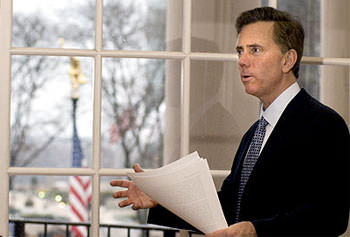Ned Lamont: The Truthdig Interview
The wealthy cable entrepreneur and darling of the progressive blogosphere discusses his antiwar primary challenge against Connecticut's pro-war Democratic Sen. Joe Lieberman. "The state party brass, they don't like primaries. Competition is a little unsettling to them."
During a speech at a Connecticut state fundraising dinner last month, Sen. Joseph Lieberman had to shh the crowd three times — not because they were cheering him, but because they were ignoring him in favor of their own conversations.
According to the New York Times:
The inattentiveness — as well as the scattered boos amid the supportive calls of “Joe” that welcomed Mr. Lieberman to the podium — convinced some that the three-term senator, criticized for months because of his continued support for the war in Iraq, may be vulnerable in the primary challenge he faces.
That primary challenge comes in the unlikely form of Ned Lamont, a 52-year-old cable television entrepreneur from Greenwich, Conn., who has never held more than local office and who stepped forward only when no other Democrat in the state appeared poised to do so.
“All the political leaders in the state told him, according to Lamont, “‘Ned, if you feel so strongly about it, you do it.'”;
Although Lamont is not waging a one-issue campaign, even he acknowledges that he probably would not be running were it not to offer Connecticut voters an up-or-down referendum on the Iraq war. Lamont favors pulling U.S. troops off the front-lines of the Iraqi battlefields immediately, whereas Lieberman is perhaps President Bush’s most reliable war apologist in the Democratic Party.
As a result, Lamont’s bid to unseat Lieberman in the August Democratic primary has become perhaps the most-watched senate race in the nation. If a political neophyte with scant name recognition and little party backing can use his opposition to the war to wrest power away from a three-term senator who began the race with a 55-point lead in the polls, the upset will embolden every antiwar challenger who is eyeing a seat in the 2006 mid-term elections, or even the White House in 2008.
Despite his anti-establishment pretensions, Lamont was the fifth (yep, fifth) generation of Lamont men to attend the elite Phillips Exeter Academy and then Harvard. He went on to graduate from Yales School of Management, and soon after founded Lamont Digital, which builds cable television systems for universities and gated communities across the country.
Before throwing his hat into the ring last March, however, the only elective office he ever held was as a selectman for the town of Greenwich in the 1980s, and later on a town finance board. He ran unsuccessfully for state Senate in 1990. Lamont said the desire to spend time with his wife (an investment banker) and children kept him from seeking higher office.
Starting in 1992, he began working for and holding fundraisers on behalf of a succession of presidential candidates — first Clinton in 1992, then Bill Bradley in 2000, and John Kerry during the last cycle. Post-2004 disillusionment with the lack of fresh ideas in the Democratic Party led him to seek out a more intimate form of public serviceteaching high school courses on entrepreneurship in the low-income city of Bridgeport — in addition to getting involved with policy debates at the Brookings Institution, a center-left think tank in Washington.
Though observers of Connecticut politics are still calling Lamonts candidacy a long-shot, Lieberman is taking the challenge seriously — hiring top-gun media consultant Carter Eskew to shake up his campaign; spending money on TV spots for the first time in a decade; and saying publicly that he would consider running as an independent if he lost the Democratic primary.
Indeed, in the progressive blogosphere, disgust with Lieberman for his perceived role as a lapdog for the Bush administration is rife, whereas Lamont is often portrayed as the best thing to hit the Democratic Party since Barack Obama (who is supporting Lieberman, incidentally). In addition to Lamonts opposition to the war, his support of progressive bread-and-butter issues like gay marriage rights, universal healthcare, a progressive tax code and energy independence have quickly endeared him to many of the kinds of so-called netroots organizers who helped propel Howard Deanג’s 2004 presidential bid. According to his latest fundraising filing, Lamont has collected $341,111 from 4,337 donors, more than 90% giving through the Internet. He added $371,500 of his own money to that kitty. Of course, Lieberman has almost $5 million in his campaign account.
Lamont has until May to gather 15,000 petition signatures or 15% of the states voting delegates to qualify as a candidate. The formal primary will be held in August.
Truthdig managing editor Blair Golson caught up with Lamont in Los Angeles at the Brentwood home of legendary television producer Norman Lear, where Lear and Internet icon Arianna Huffington were hosting a party to celebrate the book “Crashing the Gate by Markos Moulitsas ZҔniga of DailyKos.com and Jerome Armstrong of MyDD.com. When Lamont was introduced as Liebermans challenger, more than one person in the room shouted obscenities at the mention of the senatorڒ’s name.
Lamont later called Truthdig to talk about his insurgent campaign; about what would have kept him out of the race; and how the law of supply and demand has informed his stance on Americas war on drugs.
Blair Golson
: How do you reconcile your relative lack of political experience with your ambition to be a U.S. senator?
Ned Lamont: The Senate should not be a sinecure for career politicians. Somebody who started up a business from scratch and someone who knows how hard it is to be a small businessman in this country, who works with employees over a period of years and knows the trials and tribulations of families, and how healthcare and pensions weigh on them–those are important experiences that are underrepresented in Congress. We have plenty of former attorneys general.
The excitement around your candidacy has been fueled in large part by bloggers, much the same way as was Howard Dean’s presidential run. How has that dynamic affected your efforts?
Im very appreciative of the blogs. IҒ’m coming at this race as a bit of an outsider, with not high name recognition, and who cares passionately about the issues, but when I talk to the mainstream media, its all about process and money and delegates. It was the blogs who said, “Hey, there are compelling issues out there, and lets see how Lamont stands.Ғ” Whatever the blogs reputation, they opened the door to more serious discourse than the mainstream media did.What made you get into this race?
Six or eight months ago, a variety of decisions made by the Bush administration, and some made by Sen. Joe Lieberman, got me thinking that a challenge to Lieberman was long overdue. So I started talking to political leaders in the state and seeing if any of them were interested in undertaking the challenge, and if there was any way I could support them. And they all said, Ned, if you feel so strongly about it, you do it.”
What were those issues that prompted your run?
It was three unrelated incidents. The Terri Schiavo case: I thought the federal government was intruding on our private lives in a way that the founding fathers never anticipated. Sen. Lieberman said the federal government has to intervene in a case of life and death like that.
Two, the bridge to nowhere: It was symptomatic of a government not serious about transportation or the environment; it was a government run by lobbyists and a bunch of career politicians who werent speaking out. And the five or six thousand earmarks [in the budget] were symptomatic of a government process gone awry.
Thirdly, when Jack Murtha stood up: We finally we had a Democrat who was so well regarded in the military saying that staying the course is not a winning strategy in Iraq–and it was Sen. Lieberman who took the Republican talking points and said that these critics were undercutting the credibility of the president. And then when [Lieberman] wrote that piece in the Wall Street Journal, entitled Ӓ”Our Troops Must Stay, that was a defining moment for me.
If Lieberman were to start attacking the prosecution of the war, sort of the way that John Kerry and Hillary Clinton are doing, would that keep you out of the race?
Too late now. We’ve got the dead, the casualties, the hundreds of billions spent. At this late hour to say, On second thought, Iԓ’ve changed course and think its wrong”I think we should hold people accountable.
If he had done this two years ago, if he had said, җ”Look, I thought the invasion was justified, but its not working and the situation is getting worse and I think it’s time we started bringing our troops home,” and he had taken a lead on that, would I have been as incented to get into this race? No.
What should we do, right now, in Iraq?
Move our front-line troops out of harms way. Start bringing the 130,000 troops who are stuck in the middle of that bloody civil war onto the periphery, and start bringing our combat troops home.
But can we maintain our reconstruction efforts without the cover that American forces at least try to maintain?
YouҒ’ve got 230,000 troops in the Iraqi army who are more or less trained, youve got a police force that is ridden with militias, obviously, but if the Iraqis can put together this unity government over the course of the next 30 days, anything is possible. Perhaps the Arab League, the Saudis, even the U.N. can help with some of the security functions, so reconstruction can start again.
I think Americans should remain in the background, aiding in the construction — we cant desert the people of Iraq, but right now our front-line military presence is not making the situation better. It is stirring things up, making it worse.
Do you suspect Iran is making a nuclear bomb?
I suspect they are making a bomb, just like India and Pakistan have. ItҒ’s a source of great nationalist pride. I think theyre a little paranoid. They see Afghanistan on one side of them and Iraq on the other side of them, and a [U.S.] president who is talking about an Axis of Evil. Maybe they are worried. I certainly read all of [Iranian President] Ahmadinejad’s evil rhetoric about wiping Israel off the map, so I think theres a whole variety of motivations for them to get the bomb.
Do you think itҒ’s inevitable that theyll get the bomb, and should the U.S. base its diplomacy on that assumption?
No, on the contrary, we should work diplomatically and aggressively to give them reasons why they don’t need to build a bomb, to give them incentives.
How would that work?
We have to engage in very aggressive diplomacy. Id like to bring in allies when we can. IҒ’d like to use carrots as well as sticksto see if we can change the nature of the debate.
Iran has a large middle class; they’re dependent on the sale of energy products to China; they want to engage more with Western Europe; they have a longstanding relationship with Russia, so there are levers we can use with people who have real leverage with Iran.
We have so many different ways we can engage them, and all this saber rattling and Axis of Evilד” rhetoric is playing into the hands of the nationalists and the extremists in Iran.
We cant take diplomacy off the table. But Lieberman is the one who keeps talking about keeping the military option on the table.
Where else do you differ with Lieberman?
One of the crucial issues confronting our country is energy independence, and its corollary: global warming and the environment. I thought after 9/11 we had a real unique opportunity to deal with those twin issues in a serious way. Instead the president invited the lobbyists to Dick Cheney’s office and we ended up with the energy bill that gave away tens of millions in subsidies to the oil producers, very little for energy conservation and efficiency–and Sen. Lieberman supported that bill. Between Iran and that energy bill, thats two big reasons youҒ’ve got gas at over $3 a gallon now.
What should be the broad themes that govern our approach to guarding against future domestic terrorist attacks?
Were a much stronger country when we work in concert with our neighbors and allies and deal with the rest of the world with respect. We’re a much stronger country when we hold true to our values and our heritage, when our moral authority isnt compromised. I think there is a battle of ideas, and we have to be true to what we stand for.
I think when it comes to the nature of our defense in our own homeland, I think we should follow the recommendations of the 9/11 commission. We should look at where weҒ’re vulnerable, we should pay more attention to our first responders, pay more attention to our ports, and to our major energy facilities–starting with our nuclear power plants.
Which politicians would you most like to emulate?
I thought Bill Bradley was a real ideas politician, a political entrepreneur. The fact that he was dealing with healthcare in a really serious way. I like the way he was thinking about nuclear proliferation, I thought this was a man I could aspire to.
What about current officeholders?
Jack Murtha. I was proud of how he spoke up against the war.
How do you feel about our nations war on drugs?
The nation’s war on drugs? Thats a good one; I hadnҒ’t had that question yet. Look, as long as theres a demand, people are going to find a way to get drugs in this country. And sure, I could talk about tighter border controls, I could talk about interdiction, I could talk about dealing with it in Afghanistan, Bolivia, Colombia — wherever the sources are, but lets face it–the law of supply and demand: As long as thereҒ’s an overwhelming demand here, drugs are going to find their way in.
When it comes to drug use in this country, weve got to be very forthright with our kids and family and talk about it in a way we find constructive alternatives to drug use. That’s our best hope.What about on the state and federal level? Sending people to jail for nonviolent drug-related crimes?
Im very skeptical about that. It doesn’t act as a deterrent. And it congests our jails with folks who arent a danger to society, and in many cases we have revolving doors–in which people who are a danger to society are let out. Where drug addiction is a disease, it should be treated as a disease. Where itҒ’s a crime, it should be treated as a crime.
How much of a priority is drug policy reform for you?
I spent a lot of time teaching school in Bridgeport, so the degree to which Ive devoted a lot of my time to education and working with kids, seeing kids whose lives have been ruined or at least interrupted by drug use, it’s emotionally very important to me. As a national priority where Id devote a lot of my time, IҒ’d like to be more constructive. Id like to deal with education, jobs, positive things that could be a constructive alternative to drug use. That would be more my focus.
Where are you on gay marriage?
There are some places where the government should butt out and leave people alone. And if two people are in love and want to get married, God bless ’em. Im not advocating anything, but I am saying that the government should know when itҒ’s overstepped its bounds. All this stuff about a constitutional amendment outlawing the right of gay people to get married–thats wrong. It’s wrongheaded. We dont need those kinds of restrictions. WeҒ’re going to figure those things out as a society, and Id just tell government to step back.
Do you prefer a more progressive tax policy than the one we have now?
Yes. We have an incredibly complicated tax code loaded with loopholes and exemptions, and billions of dollars that go uncollected each year due to the complexity of the laws. I would simplify the code, broaden the base, and I generally support a progressive tax structure.
So people like you should have to do more of the heavy lifting?
Sure. I think that’s fair.
What kind of support or lack thereof have you received from state- or national-level Democratic parties?
There you go, I just praising the blogs for not doing process, and here we are doing process.
Well, uh, because
I҅’m kidding you. Look, the state party brass, they dont like primaries. Competition is a little unsettling to them. But the grass-roots [organizers] say that this is great, that senators ought to earn their keep and listen to their constituents. We haven’t seen Sen. Lieberman in an awful long time, and this is going to make him come back to the state and defend his point of view. So I think theres a disconnectҒ — a little bitbetween the party brass and the grass roots.
What do you expect from Lieberman in the campaign?
What I’d like to see is a good, honest discussion about the issues. Id like to see Lincoln-Douglas debates around the state, agreements on capping TV–
Thatג’s what youd like. But what do you expect?
Aha! I tried to sneak that in. What do I expect? I expect his campaign won’t mention my name, theyll belittle the seriousness of our effort. They wonҒ’t engage on issues; theyll talk a lot about process; but I’d like to think that sometime after the convention in May, if and when we get our 15% [of the delegates], then at that point the senator will take us seriously and well have a good, honest debate on the issues and let people decide where they stand.
WhatҒ’s the biggest political risk youve taken in this campaign?
A lot of people thought I was crazy challenging a three-term senator who was a vice presidential nominee, who has millions in the bank. But now I think people know I’m not afraid of a challenge, and will stand up and do what I think is right.
In terms of specific issues, we took a little heat on the Dubai ports deal. It seemed to me that we shouldnt jump to conclusions–that we donҒ’t want Arab companies managing our ports. I was a little worried by the xenophobic tone of the debate early on, and thought we needed some frank and honest discussions about that.
Have you drawn any lessons from the candidacies of people like Mike Bloomberg or Jon Corzine, men who pumped huge sums of their own money into their campaigns?
People can tell a phony, and they dont want anybody buying an election. That’s point number one.
Point number two, Im no Corzine. I couldnҒ’t begin to do that. As everybody knows, I got this thing off to a credible start, but its going to be a grass-roots effort. We need thousands of donations, or else it’s going to be a lonely struggle. And were getting those donations, and thatҒ’s really important.
Thirdly, the one thing we have in common is that neither of us have a lot of big party support, lot of lobbyist support, K Street money. From a grass-roots point of view, theres a lot of independence there. And I like people with a whole lot of viewpoints being represented in the halls of Congress. That’s good for the process.
Do you feel there is any moral need to cap what you put into your own campaign? Should the ratio of donated money versus your own money not be grossly out of whack? Or is that hobbling yourself?
On the contrary. I think we should cap spending on this. I think we should find non-30-second-sound-bite ways of addressing issues.
If I start getting attacked in the media and I have to start defending myself, I hope to God I can raise some money that allows me to do that. If I had to, Id put a little of my own money in to make sure we get our message out and defend ourselves.
Are you ready to challenge Lieberman to a specific set of campaign caps or restrictions on how the campaign is financed or run?
IҒ’ve tried to do it by example. I said that were not taking any Washington lobbyist money. There’s a quid pro quo there. Also, weve said publicly on a number of cases that we widely endorse the idea of a cap on spending. I think that is the key campaign finance reform.
Longer term, public financing is probably a place we have to end up. These incumbents donҒ’t really get challenged. There arent many folks who come along and jump-start a campaign, like I’ve been able to do. But I think with the blogs, grass roots, net roots, I think youll see more populous types of campaigns. I hope thatҒ’s an example people can take from our case. Because thats going to mean you have more competition in the marketplace, and that’s always good.
Your support matters…Independent journalism is under threat and overshadowed by heavily funded mainstream media.
You can help level the playing field. Become a member.
Your tax-deductible contribution keeps us digging beneath the headlines to give you thought-provoking, investigative reporting and analysis that unearths what's really happening- without compromise.
Give today to support our courageous, independent journalists.






You need to be a supporter to comment.
There are currently no responses to this article.
Be the first to respond.